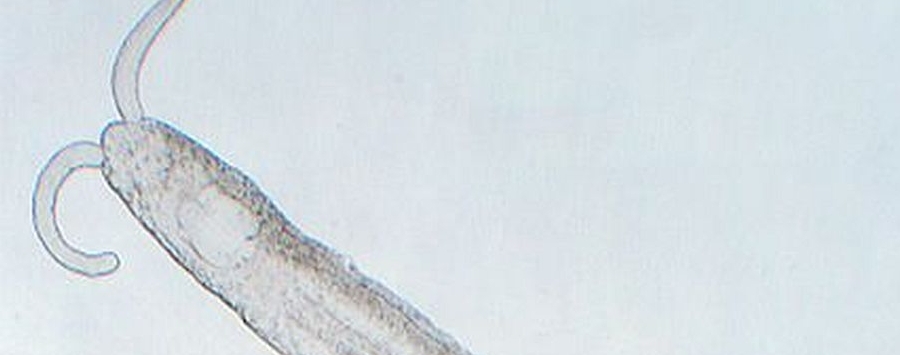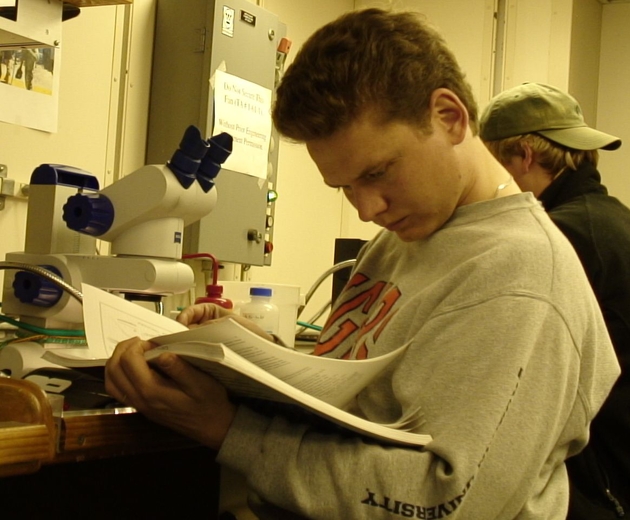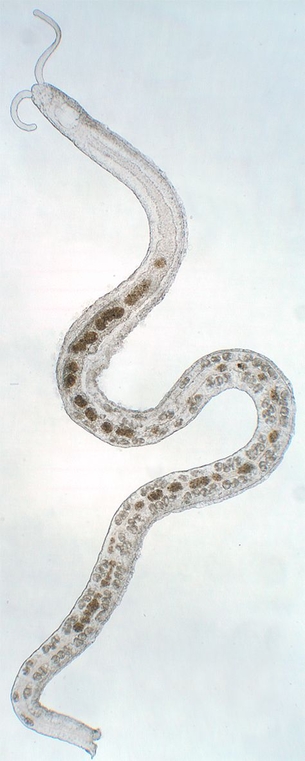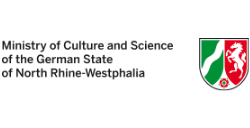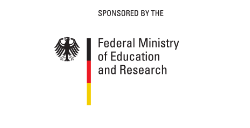The new results show, that miniaturization (reduction of the body size of adult individuals in the course of time) was as well one of the driving forces of evolution in this case. The researchers clarified the processes by using modern biomolecular and genetic techniques, which involved the analysis of 679 genes.
Till the beginning of the 20th century it was assumed that no animals lived in beaches or other marine sediments. The zoologist Remane from Kiel showed, that there is a rich community of so-called interstitial species in the space between the sand grains. These species are correspondingly simple build and small with maximal few millimeters of length. Such animals are found in nearly all groups of invertebrates, but their origin is often unknown. For many it has been assumed, that they exhibit the ancestral organization for these invertebrates. Alternatively, it is assumed, that they are derived from larger animals. Thereby, progenetic evolution is favored. In this scenario larval and juvenile stages of larger ancestors, which temporarily inhabit the sand, become sexually mature and arrest their further development of the body. Thus, a permanent inhabitation of the sand is achieved. A third, often-neglected alternative is the evolution by stepwise reduction and simplification of adult stages of larger ancestors, known as miniaturization.
Lead by researchers from the Zoological Research Museum Alexander Koenig the evolution of such interstitial species was investigated using ringed worms as an example. Ringed worms or Annelida are a very diverse group of animals with more than 15000 species.
„Ringed worms are one of the dominant benthic animal groups in the marine environment and especially in the deep sea. However, they can also be found in your own garden or at a practitioner as earthworms or leeches are also annelids«, explains PD Dr. Torsten H. Struck. In this new study, which has been published this week in the well renowned scientific journal Current Biology, Struck and co-authors investigated the relationships of such interstitial species within Annelida with the aid of transcriptomic libraries. In such libraries mRNAs of cells are determined. mRNA is a intermediate product in the translation of gen information to a protein. Based on 679 genes they were able to reconstruct the relationships and evolution of interstitial species.
»Our study shows, that the interstitial species originated not only by progenetic evolution as has been assumed in the last decades« explained Struck. Rather miniaturization of larger ancestors plays an important part in the permanent inhabitation of the interstitial realm. Miniaturization is often not considered in other animal groups as well as longer times in evolution are assumed. These results show, that besides an ancestral inhabitation of the interstitial realm and progenetic evolution miniaturization should be taken into account more often also in other animal groups.
Source: Torsten H. Struck, Anja Golombek, Anne Weigert, Franziska A. Franke, Wilfried Westheide, Günter Purschke, Christoph Bleidorn, Kenneth M. Halanych: The evolution of annelids reveals two adaptive routes to the interstitial realm. Current Biology
Url: http://dx.doi.org/10.1016/j.cub.2015.06.007
Contact:
PD Dr. Torsten Struck
Stipendiat des Heisenberg-Programms (DFG)
Tel: +49 228 9122-401
Fax: +49 228 9122-212
Mail: torsten.struck.zfmk [at] uni-bonn.de
------------
Zoological Research Museum Alexander Koenig – Leibniz-Institute for Animal Biodiversity (ZFMK) is an independent research institute. The focus of research is on performing an inventory of the zoological species diversity on earth, on the analysis of changes in biodiversity as a result of environmental factors, and on evolutionary processes at the morphological and molecular levels. ZFMK furthermore explores the context of structure and function of ecological systems, advanced scientific methods, and the study of the history of science. The permanent exhibition “Our blue planet – the living network” offers a genuine nature experience based on naturalistic ecosystem displays.
The Leibniz Association is a network of 89 scientifically, legally, and economically independent research institutes and scientific service facilities. Leibniz Institutes perform strategic and thematically-oriented research and offer scientific service of national significance while striving to find scientific solutions for major social challenges.
PD Dr. Torsten H. Struck on the research ship Atlantis.
Source: Torsten H. Struck, Anja Golombek, Anne Weigert, Franziska A. Franke, Wilfried Westheide, Günter Purschke, Christoph Bleidorn, Kenneth M. Halanych: The evolution of annelids reveals two adaptive routes to the interstitial realm. Current Biology
Url: http://dx.doi.org/10.1016/j.cub.2015.06.007
Contact:
PD Dr. Torsten Struck
Stipendiat des Heisenberg-Programms (DFG)
Tel: +49 228 9122-401
Fax: +49 228 9122-212
Mail: torsten.struck.zfmk [at] uni-bonn.de



